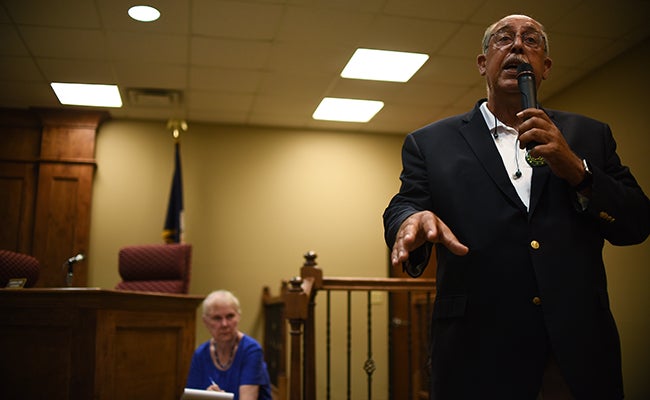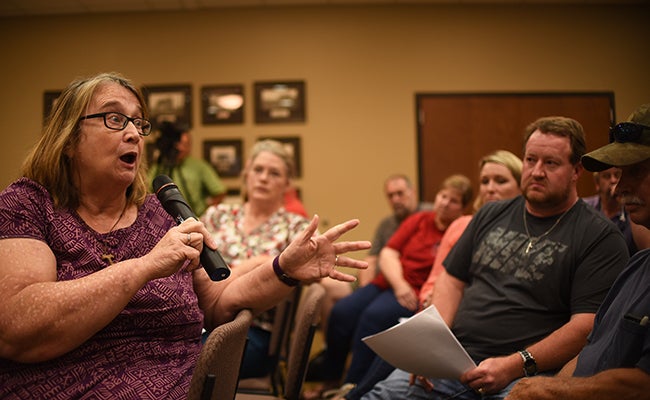Citizens discuss environment and Syrah Technologies
Published 12:22 am Wednesday, May 16, 2018
VIDALIA — Faced with a decision between environment and economy, emotions ran high Tuesday night during a meeting meant to educate the public about a new graphite company coming to Vidalia.
Concerned people filled nearly every seat in Vidalia City Hall, where residents heard about the potential environmental impact of Australian graphite producer Syrah Technologies, which aims to open a $25 million facility in the town. Even special guest retired Lt. Gen. Russel L. Honoré attended the meeting to give his input.
Scrutiny over the company ensued immediately after the company’s announcement and reached a peak in Tuesday’s meeting. By the end of the public gathering, the atmosphere had intensified, as one woman ended up shouting during an impassioned plea that Vidalia must figure out how to stop Syrah from coming and “destroying everything.”
But before that, roughly the first hour of the meeting consisted of a speech from Wilma Subra with the Louisiana Environmental Action Network, who has previously received the MacArthur Fellowship “Genius” Award for helping citizens understand and fight environmental issues in their communities.
“Tonight, we’re looking at an issue that probably has the community divided,” Subra said to the audience. “So what I’m here to do is to provide you the information that you can then use to make your decision and decide how you’re going to move forward.”
Most of Subra’s presentation listed ways that Syrah’s production could negatively impact the environment. This information could be weighed against the economic benefit the company estimates — 25 direct jobs with a $60,000 average annual salary, 30 other indirect jobs and potentially $50 million of returns to the area.
As one example of an environmental impact, Subra said that for every ton of spherical graphite produced, two to three tons of waste material would result in turn.
She also discussed how the graphite production could lead to higher ozone levels.
“If you have lung problems, if you are elderly, if you’re on chemo(therapy), the ozone levels are really detrimental to your health,” Subra said.
Another big concern, Subra said, is how the company plans to utilize the town’s waste water system.
“This is where you move from the air to the water supply, and it sort of gets a lot worse,” she said.
Subra said Vidalia had indicated it could handle the wastewater discharge from the facility that will result from manufacturing, but Subra said the town’s capability and authority to do so is questionable.
Citing Louisiana Department of Environmental Quality documents, Subra said Vidalia does not have the authority to accept industrial wastewater. Other facilities, including BASF, do not release untreated wastewater into Vidalia’s system.
“How can the (town) be saying, ‘We can take the graphite wastewater?’ That’s a huge, huge issue,” she said.
Improvements to the sewage system that would be required to handle this additional wastewater, Subra said, could end up falling on the taxpayers’ shoulders.
Additional concerns about emissions were highlighted by Subra’s comparison to a facility in Gramercy, Louisiana, called Noranda Alumina LLC. She said the emissions from the bauxite company “stained everything in that area red,” all while adhering to LDEQ regulations.
Although the proposed Vidalia facility would be looking at only 1/20 of those emissions, Subra said that would still be enough to cover the area surrounding the plant in a dark-gray substance.
“It’s going to be huge amounts of particulate matter all over everything,” she said. “And don’t look at DEQ to do any type of enforcement, because it won’t happen.”
When the floor opened up for the public’s questions, viewpoints from each side of the aisle were heard.
Resident James Bradford, for example, defended industry in the town. Though Bradford said he understood environmental concerns, he also said that if they want to disallow this new facility, they would have to shut down other companies that have similar manufacturing practices.
“Shut them all down if you don’t want to have nothing in this town — in this whole parish,” Bradford said. “Because what you’re doing ain’t been working around here.”
On the opposite end of the spectrum, there was Jane Gardner, who by the end of the meeting was shouting in a fervent plea to keep Syrah out of Vidalia.
“For 25 jobs? This is not what we want in the community,” Gardner said.
Many others chimed in about their own concerns about the company, ranging from emissions to potential burdens on the taxpayers to the ability of the fire department to handle a spill or other incident involving the chemicals at the plant.
Responding to concerns about emissions, resident and chemist Tanya Richardson said she respectfully disagreed with some of the data presented Tuesday night.
“As a community, I think that maybe (with) some of our concerns, it would be better if we talked about it, because some of the data or some of this, from what I’m reading, I don’t necessarily agree with,” she said.
As an example, Richardson said many of the emissions listed in the presentation consisted of natural gas emissions, and she tried to downplay some of the concerns about chemicals discussed during the meeting.
“Maybe we need to have a meeting as a group, as members of the community, and really talk about the issues instead of being told what the issues are,” Richardson said.
Another citizen, Ruth Powers, said whatever happens, the town must be diligent in keeping an eye on the company. Powers questioned why nobody from Syrah had come to the meeting to respond to these concerns, and she wanted to ensure Vidalia does not get the short end of the stick.
“If they come in here, they need to know that we’re watching them,” Powers said. “Companies like this make it a habit of going to places where they figure the population is poor, dumb and desperate.
“Let’s make sure we’re not poor, dumb and desperate.”
Near the end of the meeting, the crowd received words of encouragement and caution from Honoré, who asked the crowd to press politicians and keep a watchful eye on their community.
“These companies, they come in, they make your money, and they ship it back home,” Honoré said. “They’re polluting our air and polluting our water. Think of how many places you can’t go now and fish today that you fished when we were little boys, because the water is polluted?”
To end the meeting, organizer Pam Clayton reiterated that the purpose of the meeting was to educate the public and reminded those in attendance that the goal was to come together to make an informed decision about what’s best for the area.








